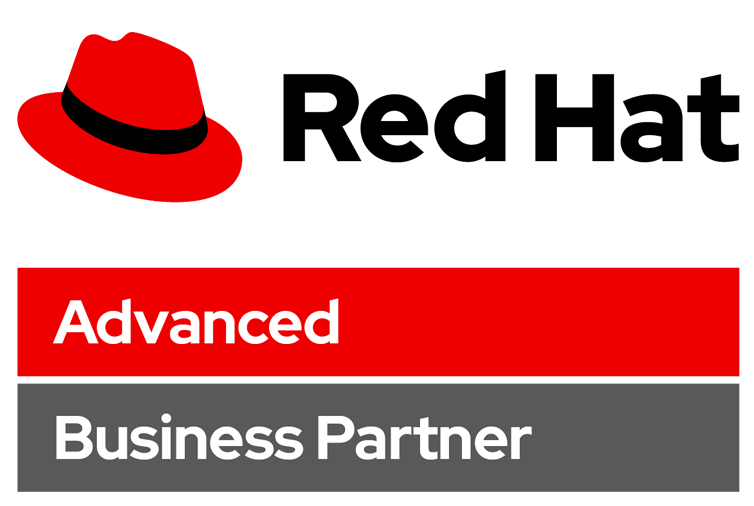The Business Value of Red Hat Training
Red Hat Enterprise Linux has firmly established itself as a preferred delivery vehicle for modern applications and as a platform for cloud infrastructure. The trust Linux has earned has been developed by building ecosystems, rich application portfolios, a reliable environment that offers scale and security, and robust application support that enterprise customers require. These benefits aren’t simply built into the application. These capabilities are enabled by well-skilled developers, administrators, and infrastructure management teams. IDC research has found that training impacted IT professionals consistently increases both individual capability and the ultimate business value of the supported technology.
IDC conducted interviews with IT staff who have completed Red Hat training courses through the Red Hat Training and Certification program to understand the impact on their skills, performance, and productivity levels. IDC’s research demonstrates that, compared with staff who have not completed training, employees with Red Hat training apply knowledge about new technologies much better, work more efficiently and effectively, onboard faster, and are regarded as higher-performing employees. This is important both for development teams that can deliver new software and features faster and for otherIT teams responsible for delivering IT services to support business operations.
Based on the above distinguishing characteristics of Red Hat-trained staff, interviewed organizations attributed strong value to having staff complete training, which IDC quantifies as worth an average of $43,800 per year per employee trained, as a result of:
- Ensuring knowledge of important new technologies, including OpenShift, Kubernetes, Ansible, and container-based development practices
- Empowering DevOps and development teams to deliver more functional and timely applications and features, which translates to value for their employees and customers
- Enabling other IT teams to work more efficiently through best practices and a deeper understanding of the technologies they support
- Optimizing IT costs by leveraging new technologies to establish more cost-effective IT infrastructure foundations
- Improving staff’s ability to meet performance expectations from onboarding through decisions about promotions, thereby increasing the value and satisfaction of staff
Red Hat Training
Red Hat’s Linux curriculum is built on the experience of its own support teams, its field personnel, and Linux professionals from around the world. The course and certification offerings span the breadth of tools offered by Red Hat and the range of roles that leverage Red Hat, from system administrators to developers to security professionals.
Red Hat leverages sophisticated adaptive assessments to help identify the most appropriate curricula or courses to support individual or team development.
The assessments cover more than 20 skills and tools such as:
- Red Hat Enterprise Linux System Administration
- Advanced Automation: Ansible Best Practices
- Red Hat OpenStack Platform Administration
- Red Hat OpenShift
- Container-Native Application Development
IT professionals and teams that are either masters of Linux or relatively inexperienced find approaches, topics, and courses to help them better leverage Red Hat within their organization.
The Business Value of Red Hat Training Courses
IDC conducted research that explored the value and benefits for organizations of having various IT teams complete Red Hat training courses through the Red Hat Training and Certification program. The project included eight interviews with individuals at organizations with experience and knowledge about the benefits and costs of Red Hat training programs. The interviews covered various quantitative and qualitative questions about the impact of having Red Hat-trained staff on topics such as IT staff capabilities and performance, IT’s ability to support business operations, and the impact of training on staff onboarding,success, and tenure.
This table presents demographics for interviewed Red Hat customers. The scale of their business operations is reflected in an average employee base of 111,250 and average annual revenue of $14.05 billion. In terms of geographical diversity, three companies were based in the United States, two were based in Italy, and the others were based in Canada, Colombia, and India. These companies spanned the following vertical markets:construction, financial services (2), government, professional services (2), software, and telecommunications.
Reasons for Choosing to Have Staff Complete Red Hat Training Courses
Interviewed organizations discussed the rationale behind their decision to have staff complete Red Hat Training courses. They described facing similar challenges in terms of needing to ensure that key IT teams — including DevOps, development, IT infrastructure, and IT security teams — are fully trained and up to date on current Red Hat systems and technologies, as well as emerging technologies such as OpenShift, Ansible, and Kubernetes, including developing capabilities to leverage container application development approaches. They needed to upskill staff in key technologies to maximize IT’s contribution to their businesses, ensure the ability to leverage open source technologies core to their IT operations, and bolster the quality of applications and services delivered to employees and customers.
Red Hat Training Courses Completed at Interviewed Organizations
Interviewed organizations have staff complete Red Hat training courses for a variety of technology subject areas. They described this mix of training as integral to their ability to maximize the ability of IT teams to leverage important technologies, especially OpenShift and Ansible. The Red Hat training courses focused on three key areas: application development, management and systems administration, and security. Table 2 provides data on courses completed by staff at interviewed organizations. On average, they have 302 employees who take Red Hat training courses annually for a total average of 363 Red Hat training courses. Study participants’ interest in deepening employees’ skills and capabilities across Red Hat technologies is reflected in the training course mix, including Red Hat Enterprise Linux (229), OpenShift (53), Ansible (33), and DevOps (31).

IT staff productivity benefits: The value of Red Hat training courses is reflected most directly in increasing the capabilities of trained staff. With Red Hat training, DevOps, application development, IT infrastructure, IT security, and help desk teams better understand Red Hat technologies and apply this knowledge to work more efficiently and effectively. IDC estimates that study participants will realize IT staff-related efficiencies and productivity gains worth an annual average of $33,600 per employee trained ($4.38 million per interviewed organization).

- Risk mitigation benefits: IT teams with training better understand the technologies they use, which allows delivery of more available and resilient IT services, thereby minimizing productivity losses associated with unexpected outages. IDC calculates that study participants will realize average annual productivity gains worth $3,600 per employee trained ($475,100 per interviewed organization).
- Business productivity benefits: The ability to bring new staff who have completed Red Hat training up to full productivity faster means that study participants benefit from higher productivity for new hires. IDC quantifies this onboarding-related productivity value at an annual average of $3,300 per employee trained ($431,900 per interviewed organization).
- IT infrastructure cost reductions: Staff who have completed Red Hat training better leverage technologies and approaches that enable more cost-effective and optimized IT environments. IDC estimates that study participants will realize IT-related cost savings worth an annual average of $3,200 per employee trained ($420,400 per interviewed organization).
Improved Staff Technological Knowledge and Capabilities
Red Hat training programs are designed to help customers optimize their investment in Red Hat products and technologies by drawing on industry experts to provide up-to-date and relevant instruction and best practices. By taking Red Hat training courses, DevOps, application development, IT infrastructure, and IT security teams better understand Red Hat systems and technologies and apply this knowledge to support business activities efficiently and effectively.

Digital transformation and new technologies are creating rapid change for nearly all IT organizations. This makes ongoing and continuous skill development for IT teams essential. IT teams that complete relevant training are more effective because they can apply new skills and knowledge to their work. Study participants confirmed that Red Hat training fostered a critical understanding for many of their IT staff of OpenShift, Ansible, Kubernetes, and other key Red Hat technologies, including taking container-based approaches to application development. Furthermore, completing training has improved their ability to stay up to date on newer technology advances and to work with other team members more cooperatively.
Delivering More Value by Deploying Applications More Quickly and Robustly
IDC projects that organizations will create more than 500 million new applications globally by 2023. This means that IT organizations have no choice but to enable their development teams to deliver highly functional and differentiated business-critical applications and new features on accelerated development cycles through technological innovation. Advanced training takes on increased importance given the demands placed upon development teams as they learn to use and then apply new technologies and approaches.
Development activities depend to a significant extent on the ability of IT teams to provide compute, storage, and other IT resources — including containers — in a timely and robust manner. Study participants linked being able to deploy IT resources faster and with more agility to having staff who have completed Red Hat training courses. One interviewed organization noted: “Red Hat Training shows our DevOps team how to automate a repeatable task. They can write one playbook to execute a set of tasks that would have taken hours or days of time.”

Study participants reported that staff with Red Hat training can deploy IT resources — including physical servers, virtual machines, containers, and storage — an average of 59% faster, which virtual a substantial improvement in their ability to ensure that their IT organizations can support development and business operations in a timely manner. Study participants confirmed that Red Hat training courses have enabled their DevOps and development teams to create additional value by leveraging and using Red Hat technologies to deliver more timely, robust, and differentiated applications and features. With Red Hat training, DevOps and development teams deliver more value to their businesses by deploying applications and new functionality faster in support of employees and customers. Study participants linked improved developer performance to improved ability to use the Red Hat OpenShift platform, apply DevOps principles, and automate development-related processes with Red Hat Ansible.
IT Management and Security Efficiencies
Study participants explained that their IT infrastructure and IT security teams better understand Red Hat technologies after completing Red Hat training courses and can apply this knowledge to work more efficiently and effectively. These benefits link to better understanding of both well-established technologies such as virtualization and more recently implemented Red Hat solutions such as Ansible. Overall, completing Red Hat training courses has helped study participants leverage technologies such as Ansible and OpenShift to reach much higher levels of automation and virtualization in their IT environments, which in turn drives significant efficiencies for IT infrastructure and security teams. Red Hat customers also appreciated that the training provided better integration of their systems with customer platforms.

Optimizing the Cost of IT Infrastructure
Interviewed companies reported that IT teams completing Red Hat training can better leverage technologies and approaches to create more cost-effective IT environments. Technologies such as containers and Kubernetes offer approaches for consolidating and optimizing IT infrastructures, and Red Hat training courses ensure that staff have the knowledge needed in these technologies to architect and build their infrastructures in a more optimal fashion. For study participants, having more skilled and knowledgeable staff has a clear connection to optimizing IT infrastructure costs.

This figure quantifies these benefits, with IDC calculating three-year total costs per organization to be 21% lower through infrastructure optimization and rationalization, saving interviewed organizations an average of $1.25 million over three years.
Staff Performance Benefits: Onboarding, Performance, and Tenure
Study participants also reported benefits from Red Hat training related to their employee hiring life cycle, including employee onboarding, performance, success, and tenure. They linked completion of Red Hat training courses to improvements in each of these areas. More importantly, several interviewed organizations linked completion of Red Hat training courses to having staff who better understand, support, and drive broader corporate strategies and initiatives. The deeper integration and linkage of staff to these types of objectives make sense given that trained staff not only are regarded more highly by their colleagues and managers but also likely appreciate training as an investment in success and career prospects with their organizations.
Enables more proactive thinking: Study participants tied completion of Red Hat training courses to staff’s ability to work more proactively and flexibly. For organizations, having creative and flexible employees is very important. As technologies and business opportunities change quickly, staff must have the ability to adapt to new technologies and understand how to identify and drive new business activities. One study participant commented: “Staff who have had Red Hat training can adapt to do things on the fly more quickly. It gives them a new perspective and gets them out of the ‘this is how I’ve always done it’ way of thinking.”
Increases employee satisfaction and tenure: Study participants generally linked higher employee satisfaction to completion of Red Hat training courses, and several participants noted that trained staff tended to have longer average tenures. They attributed higher satisfaction to the fact that employees view training as an investment in their skills and prospects, thereby improving morale and satisfaction.
Bolsters employee performance: Interviewed organizations spoke very positively about the impact of staff completing Red Hat training courses on their performance. On average, they estimated that they would be three times more likely to hire an employee trained during onboarding again compared with employees who do not complete training and almost four times as likely to hire a staff member again who already had completed Red Hat training before being hired.
Achieves full productivity in less time: IDC also evaluated the time required to bring a new team member up to full productivity after being hired. Figure 5 (next page) addresses the benefits associated with staff onboarding. Red Hat training accelerated job readiness by 55% in cases where new team members were being trained as part of the onboarding process and by a full three-quarters (76%) when a new hire had already completed Red Hat training prior to onboarding. One study participant commented: “Anyone who has taken Red Hat training courses is going to have a much better ramp-up into the role because 60% of their job is doing administration of Red Hat systems. If they don’t have training, it takes longer to get them up to speed in the role.”
Impacts organizational culture positively: Several study participants also commented on how Red Hat training positively affects their overall cultures by upskilling and empowering their staffs.

ROI Summary
This table presents IDC’s analysis of the financial benefits and investment costs for study participants in having staff complete Red Hat training courses. IDC calculates that study participants will achieve total three-year discounted benefits of $13.71 million per organization ($105,200 per employee trained) in terms of development and IT staff productivity gains and efficiencies and optimized IT infrastructure costs. These benefits compare with projected total discounted investment costs over three years of $2.95 million per organization ($22,600 per employee trained). IDC calculates that at these levels of benefits and investment costs, the interviewed Red Hat customers will achieve a three-year return on investment (ROI) of 365%.

Conclusion
Because technology advancement continues at a frantic pace, IT professionals must grow their skills. IT managers should leverage the training offered by companies such as Red Hat to ensure their staff can effectively leverage new technologies and drive real business change. Effective training programs can help improve an IT professional’s productivity as well as enterprise security. In addition, training can help new hires become contributing members of the team more quickly and help ensure more engaged and satisfied employees.
IDC’s research demonstrates the substantial value for organizations in ensuring that their IT teams have completed high-quality, relevant, and professional training with Red Hat. To maximize their ability to work competently and efficiently with both well-established and new technologies, staff need access to expertise and best practices, which Red Hat training courses provide. As a result, staff who have completed Red Hat training courses are more capable of using new technologies, work more productively, and better meet performance expectations than their untrained colleagues. According to IDC’s study, this means DevOps and development teams create more value through timely and efficient delivery of high-quality applications and features; IT infrastructure, security, and help desk teams support their businesses more efficiently; and Red Hat-trained staff generally perform better across their employee life cycles, from onboarding through promotions. These benefits generate strong value for study participants compared with the costs of having staff complete Red Hat training courses, with IDC calculating that study participants will realize an average 365% three-year ROI.








